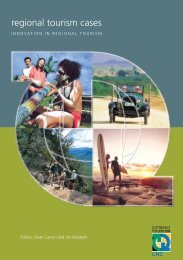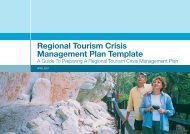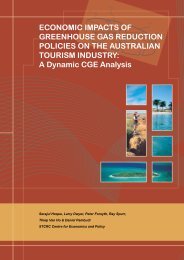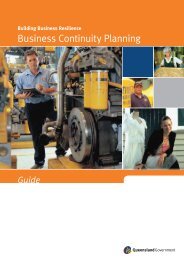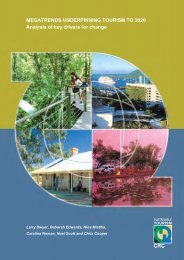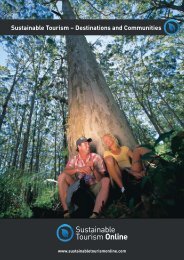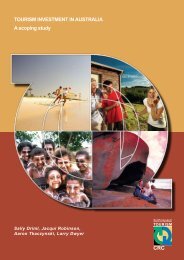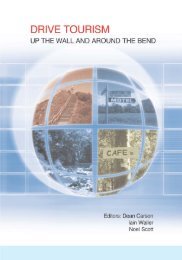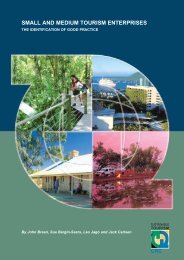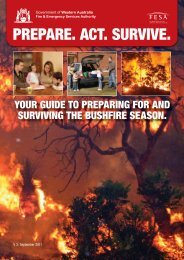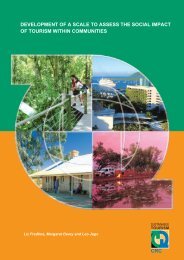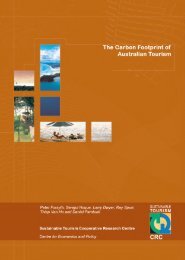Climate Change Action Plan - Great Barrier Reef Marine Park Authority
Climate Change Action Plan - Great Barrier Reef Marine Park Authority
Climate Change Action Plan - Great Barrier Reef Marine Park Authority
Create successful ePaper yourself
Turn your PDF publications into a flip-book with our unique Google optimized e-Paper software.
<strong>Climate</strong> change is affecting coral<br />
reefs<br />
<strong>Climate</strong> change is now acknowledged as one of the<br />
most serious threats to the long-term health of coral<br />
reefs. Already, in many places around the world such<br />
as the Maldives, Seychelles and Palau, coral<br />
bleaching has effectively destroyed over 50% of reefs.<br />
This loss of corals, triggered by unusually high sea<br />
temperatures, has far-reaching implications for reef<br />
ecosystems. Corals provide the ecological<br />
foundations that underpin enormous biodiversity and<br />
productivity, and provide food and income to hundreds<br />
of millions of people throughout the tropical world.<br />
There will also be a range of other effects of climate<br />
change on reef ecosystems, many of which may be<br />
equally destructive but are only just beginning to be<br />
understood.<br />
The implications of climate change<br />
are far reaching<br />
The vulnerability of other parts of the GBR ecosystem<br />
to climate change is also becoming apparent. Mass<br />
die-offs of seabird chicks have been recorded during<br />
periods of unusually high sea temperatures. These<br />
nesting failures are now known to be due to<br />
provisioning failure, resulting when parent birds have<br />
difficulty obtaining prey fish because of changes in the<br />
location of productivity zones. Sea turtles are also at<br />
risk. The sex ratio of turtle hatchlings is temperaturedependent,<br />
and warming conditions could see a<br />
significant bias toward females in future populations.<br />
Commercially important species, such as many fish<br />
and prawns, rely on corals, seagrasses or mangroves<br />
for some part of their life cycle. These important<br />
habitats are projected to decline under climate change,<br />
suggesting that many fisheries may also be<br />
significantly affected. These and many other potential<br />
effects of climate change will translate to significant<br />
issues for the regional communities and industries that<br />
depend on a healthy GBR. This includes the GBR<br />
tourism industry that as part of regional tourism<br />
contributes $6 billion to the national economy 2 per<br />
annum.<br />
The <strong>Great</strong> <strong>Barrier</strong> <strong>Reef</strong> is at risk<br />
The <strong>Great</strong> <strong>Barrier</strong> <strong>Reef</strong> (GBR) is not immune from this<br />
threat. It is already showing observable signs of its<br />
vulnerability, in the form of mass coral bleaching<br />
events in 1998 and 2002. In each of these years, more<br />
than 50% of the reef was affected by bleaching.<br />
Fortunately, most corals survived the high<br />
temperatures, yet approximately 5% of reefs suffered<br />
lasting damage. A more localised bleaching event<br />
occurred in 2006, leading to the death of 40% of corals<br />
around the Keppel Islands, an important group of<br />
inshore reefs off Rockhampton. An analysis of climate<br />
projections 1 indicates that coral bleaching events are<br />
expected to become more frequent and severe over<br />
coming decades, even under optimistic scenarios.<br />
Other parts of the system are also at risk, such as<br />
plankton, seagrass, marine turtles, seabirds,<br />
mangroves and fish.<br />
1 Intergovernmental Panel on <strong>Climate</strong> <strong>Change</strong>, Summary for Policy Makers (2007)<br />
2 Access Economics (2007) Measuring the Economic and Financial Value of the<br />
<strong>Great</strong> <strong>Barrier</strong> <strong>Reef</strong> <strong>Marine</strong> <strong>Park</strong> 2005-2006, Canberra<br />
4 <strong>Great</strong> <strong>Barrier</strong> <strong>Reef</strong> <strong>Climate</strong> <strong>Change</strong> <strong>Action</strong> <strong>Plan</strong> 2007–2012



